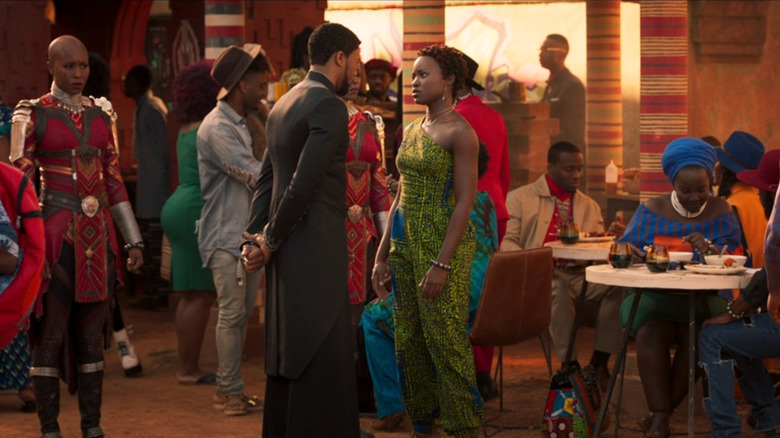The 1903 Sci-Fi Novel That Foreshadowed The World Of Wakanda
Out of all the fictional places in Marvel's extensive cinematic universe, Wakanda would be one of the most interesting places to visit in real life. Unlike the harsh, menacing atmosphere of Vormir or the opulent halls of Omnipotence City, Wakanda is a place where regular people lead real lives. Even though "Black Panther" and "Black Panther: Wakanda Forever" are action-packed films that largely revolve around the members of the royal family, the narrative offers numerous context clues about what day-to-day life is like in the formerly hidden nation. Since Wakanda has been kept a secret for so long, it makes perfect sense that it's home to a fully functioning, multi-faceted society.
With enormous deposits of vibranium enriching the very land Wakanda was built on, the people who reside there have access to incredible technology that the rest of the world hasn't even dreamed of yet. Both films show that Wakandans have a rich culture, further strengthened by a unified effort to keep the territory safe from outside influence. As far as secret cities go, Wakanda is reminiscent of fictional locations like the lost empire of Atlantis or the gilded streets of the mythical El Dorado. However, a professor who teaches at Michigan State University posits that a 1903 sci-fi novel foreshadowed the advanced structure of Wakandan civilization.
Of One Blood: Or, the Hidden Self by Pauline Hopkins tells of a secret city in Ethiopia
Julian Chambliss, an English professor at Michigan State University, recently penned an article for Salon delving into the elements of Black and Mesoamerican culture highlighted in "Black Panther: Wakanda Forever." Following the tragic death of Chadwick Boseman, grief and recovery are important themes in the film. According to Chambliss, the fictional nation's futuristic setting adds depth to the healing process Wakanda must undergo after the death of its king. Furthermore, the very idea of a hidden city in Africa can be tied back to a novel that was written over a century ago.
"Of One Blood: Or, the Hidden Self" by Pauline Hopkins follows a medical student who finds himself trapped in a secret city in Ethiopia (via Bookshop). Published in 1903, the novel is set in Telassar, a place that has remained isolated for thousands of years. Like Wakanda, Telassar holds more power and riches than people living in the outside world can even imagine, and likewise boasts advanced technology. Similar to how "Black Panther" and its successor draw inspiration from real African cultures, Hopkins includes factual information in her fictional work, using features of reality to make the more fantastical aspects of the story seem more grounded (per Brill). Both narratives explore Black empowerment, another tie that binds these tales together.
While Hopkins' book hasn't been officially named as a source of inspiration for the layout of Wakanda, the connection would make a lot of sense.

